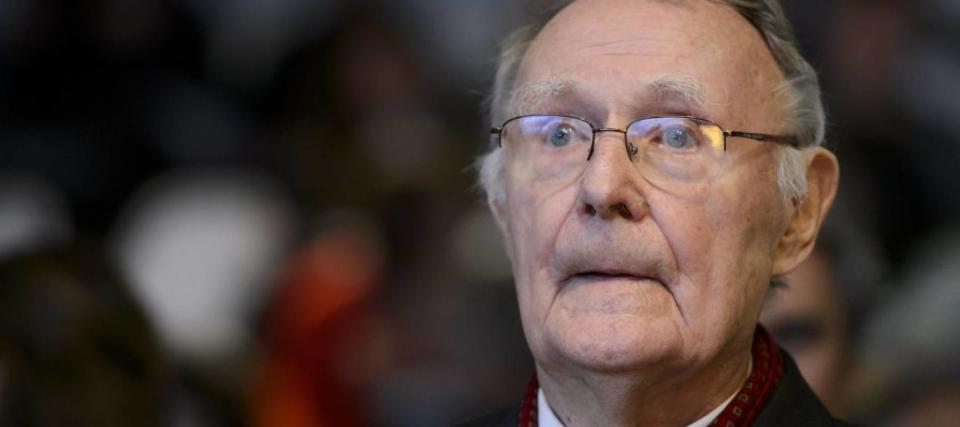'Everything we earn we need as a reserve': IKEA’s founder was so famously frugal that even his family hasn’t inherited his $58.7 billion fortune. Here’s why

When it comes to frugal billionaires, the list is a long one. Warren Buffett is, perhaps, the most famous, while Zara’s founder Amancio Ortega has a similar reputation.
However, the late Swedish business magnate Ingvar Kamprad rarely gets mentioned in this conversation. That’s because the founder of IKEA, who died in 2018 at age 91, kept a low profile and rarely gave interviews.
Don’t miss
Commercial real estate has topped the stock market for over 25 years — but only the elite had access. Now you can super-spike your wealth even if you're just an everyday investor
Inflation is still white-hot in 2024 — use these 3 'real assets’ to protect your wealth today, no matter what the US Fed does or says
Anything can happen in 2024. Try these 5 easy money hacks to help you make and save thousands of dollars in the new year (they will only take seconds)
Nevertheless, it should come as no surprise that the man behind the famously low-cost furniture retailer was himself extremely frugal. As he once said, "Everything we earn we need as a reserve."
Here’s how the reclusive billionaire built a fortune on frugality.
Cost-conscious business
Kamprad registered IKEA on July 28th, 1943, when he was just 17 years old. Starting off with a small shop that sold imported pens, watches and nylon stockings, he eventually expanded the products to include furniture in 1948.
Furniture would eventually be the company’s flagship product, but it was the price of pencils that eventually created IKEA’s culture of affordability.
Kamprad had noticed a big difference between the wholesale and retail prices of the pencils across the market. He observed that, while pencil manufacturing was cheap, the sluggish product distribution was the key reason for the price difference.
This eventually trickled down to all areas of the retailer’s business model. IKEA’s key innovation was flat packing furniture so that it could be stored and transported cheaply, thus lowering the overall costs.
Today, with more than 482 locations across the globe, IKEA is one of the largest furniture retailers in the world. In 2023, it generated more than $29 billion EURO ($31.4 billion USD) in revenue.
This success, however, didn’t change much for the company’s founder during his lifetime. Kamprad continued to live a frugal life, buying clothes from flea markets, getting inexpensive haircuts and driving an old car. He was estimated to be worth $58.7 billion, according to Bloomberg, when he passed away.
However, his frugality lives on in IKEA’s complex ownership structure today.
Read more: Unlocking financial prosperity: Jeff Bezos shares the path to prime earnings through hassle-free real estate investment — don't miss out on this opportunity to revolutionize your financial future
No inheritance
Decades before he passed away, Kamprad had placed ownership of the IKEA brand into a complex network of foundations and holding companies. These assets were not passed on to his heirs.
Instead, Stichting Ingka Foundation, a Dutch entity with the stated purpose of donating to charity and “supporting innovation” in design, controls most IKEA stores.
In addition, Liechtenstein-based Interogo Foundation holds the rights to the trademark and controls the global franchises through a subsidiary. This foundation is managed by a council where the Kamprad family members are in minority control.
The heirs also control Ikano Group, a holding company for finance, real estate, manufacturing and business assets that was estimated to be worth $10 billion USD in 2016.
Simply put, Kamprad’s heirs retained some wealth and control, but it appears the bulk of his fortune is held in charitable trusts. This complicated structure was reportedly the result of his desire to preserve IKEA’s unique culture and ensure its survival over the long-term.
Similarly, Warren Buffett and Bill Gates have donated a significant portion of their wealth to charitable foundations. In 1986, Buffett told Fortune that he wanted to leave his children with “enough money so that they would feel they could do anything, but not so much that they could do nothing.”
However, there could be other reasons why billionaires are leaving their enormous fortunes to charity. Tax benefits are often cited, but the fact that 90% of wealthy families are likely to lose their money by the third generation, according to AMG National, could be another factor weighing on their minds.
What to read next
Robert Kiyosaki warns 401(k)s and IRAs will be 'toast' after the 'biggest crash in history' — protect yourself now with these shockproof assets
Jeff Bezos and Oprah Winfrey invest millions in this rare asset to keep their riches safe — How to ride their coattails even if you're not super rich
Credit card interest rates stand at a staggering 28.9%. Use this free online tool to pay off your debt ASAP — so you can get unstuck and start building real wealth
This article provides information only and should not be construed as advice. It is provided without warranty of any kind.

 Yahoo Finance
Yahoo Finance 